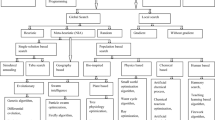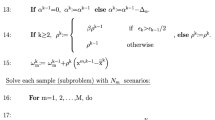Abstract
This study presents an integrated approach based on artificial neural network (ANN), genetic algorithm (GA) and computer simulation to explore all the solution space in stochastic flexible flow shop with sequence-dependent setup times, job deterioration and learning effects. The objective of this study is minimizing total tardiness of jobs in the sequences. In this study, the outputs of ANN are inputted to GA and outputs of simulation model are inputted to ANN. We consider learning effects in this problem which means that workers become more experienced with the passage of time, and thus, the processing duration decreases. Deterioration of job means that processing time is a decreasing function of its execution start time. It is not possible to propose a mathematical optimization model for the stated problem; therefore, a simulation optimization approach based on ANN–GA is introduced for a relatively large problem. Finally, actual experiments are conducted to show the applicability of the proposed novel algorithm in finding near-optimal solutions with normal, uniform and exponential processing and setup times. This is the first study that presents an integrated intelligent approach for optimal solution of stochastic flexible flow shop problem with sequence-dependent setup times, job deterioration and learning effects in a real case study.








Similar content being viewed by others
References
Yaurima V, Burtseva L, Tchernykh A (2009) Hybrid flow shop with unrelated machines, sequence-dependent setup time, availability constraints and limited buffers. Comput Ind Eng 56:1452–1463
Koulamas C, Kyparisis GJ (2000) Asymptotically optimal linear time algorithms for two-stage and three-stage flexible flow shops. Nav Res Logist (NRL) 47(3):259–268
Jungwatanakit J, Reodecha M, Chaovalitwongse P, Werner F (2008) Algorithms for flexible flow shop problems with unrelated parallel machines, setup times, and dual criteria. Int J Adv Manuf Technol 37:354–370
Iranpoor M, Ghomi SF, Zandieh M (2012) Machine scheduling in the presence of sequence-dependent setup times and a rate-modifying activity. Int J Prod Res 50(24):7401–7414
Kononov A, Gawiejnowicz S (2001) NP-hard cases in scheduling deteriorating jobs on dedicated machines. J Oper Res Soc 52:708–717
Dawande M, Gavirneni S, Rachamadugu R (2006) Scheduling a two-stage flowshop under makespan constraint. Math Comput Model 44:73–84
Vahedi Nouri B, Fattahi P, Ramezanian R (2013) Hybrid firefly-simulated annealing algorithm for the flow shop problem with learning effects and flexible maintenance activities. Int J Prod Res 51(12):3501–3515
Ng CT, Wang JB, Cheng TCE, Liu LL (2010) A branch-and-bound algorithm for solving a two-machine flow shop problem with deteriorating jobs. Comput Oper Res 37:83–90
Azizoglu M, Cakmak E, Kondakci S (2001) A flexible flow shop problem with total flow time minimization. Eur J Oper Res 132:528–538
Wang Z, Xing W, Bai F (2005) No-wait flexible flow shop scheduling with no-idle machines. Oper Res Lett 33:609–614
Pan QK, Wang L, Qian B (2008) A novel multi-objective particle swarm optimization algorithm for no-wait flow shop scheduling problems. Proc Inst Mech Eng Part B J Eng Manuf 222(4):519–539
Akrami B, Karimi B, Moattar Hosseini SM (2006) Two metaheuristic methods for the common cycle economic lot sizing and scheduling in flexible flow shops with limited intermediate buffers: the finite horizon case. Appl Math Comput 183:634–645
Khalouli S, Ghedjati F, Hamzaoui A (2010) A meta-heuristic approach to solve a JIT scheduling problem in hybrid. Eng Appl Artif Intell 23:765–771
Lee WC, Wu CC, Liu MF (2009) A single-machine bi-criterion learning scheduling problem with release times. Expert Syst Appl 36:10295–10303
Lai TC, Sotskov YN, Werner F (1997) Optimal make span scheduling with given bounds of processing times. Math Comput Model 26:67–86
Lai TC, Sotskov YN (1999) Sequencing with uncertain numerical data for make span minimization. J Oper Res Soc 50:230–243
Allahverdi A, Sotskov YN (2003) Two-machine flow shop minimum length scheduling problem with random and bounded processing times. Int Trans Oper Res 10:65–76
Matsveichuk NM, Sotskov YN, Egorova NG, Lai TC (2009) Schedule execution for two-machine flow-shop with interval processing times. Math Comput Model 49:991–1011
Allahverdi A (2006) Two-machine flow shop scheduling problem to minimize total completion time with bounded setup and processing times. Int J Prod Econ 103:386–400
Almeder C, Hartl RF (2013) A metaheuristic optimization approach for a real-world stochastic flexible flow shop problem with limited buffer. Int J Prod Econ 145:88–95
Wang K, Choi SH (2014) A holonic approach to flexible flow shop scheduling under stochastic processing times. Comput Oper Res 43:157–168
Kianfar K, Fatemi Ghomi SMT, Oroojlooy Jadid A (2012) Study of stochastic sequence-dependent flexible flow shop via developing a dispatching rule and a hybrid GA. Eng Appl Artif Intell 25:494–506
Honkomp SJ, Mockus L, Reklaitis GV (1999) A framework for schedule evaluation with processing uncertainty. Comput Chem Eng 23:595–609
Khademi Zare H, Fakhrzad MB (2011) Solving flexible flow-shop problem with a hybrid genetic algorithm and data mining: a fuzzy approach. Expert Syst Appl 38:7609–7615
Azadeh A, Hosseini N, Abdolhossein Zadeh S, Jalalvand F (2015) A hybrid computer simulation-adaptive neuro-fuzzy inference system algorithm for optimization of dispatching rule selection in job shop scheduling problems under uncertainty. Int J Adv Manuf Technol 79:135–145
Rezaeian J, Javadian N, Tavakkoli-Moghaddam R, Jolai F (2011) A hybrid approach based on the genetic algorithm and neural network to design an incremental cellular manufacturing system. Appl Soft Comput 11(6):4195–4202
Gourgand M, Grangeon N, Norre S (2003) A contribution to the stochastic flow shop scheduling problem. Eur J Oper Res 151:415–433
Zandieh M, Fatemi Ghomi SMT, Moattar Husseini SM (2006) An immune algorithm approach to hybrid flow shops scheduling with sequence-dependent setup times. Appl Math Comput 180:111–127
Browne S, Yechiali U (1990) Scheduling deteriorating jobs on a single processor. Oper Res 38:495–498
Wang JB, Huang X, Wang XY, Yin N, Wang LY (2009) Learning effect and deteriorating jobs in the single machine scheduling problems. Appl Math Model 33:3848–3853
Yang DL, Kuo WH (2011) Scheduling with deteriorating jobs and learning effects. Appl Math Comput 218:2069–2073
Low C, Lin WY (2013) Some scheduling problems with time-dependent learning effect and deteriorating jobs. Appl Math Model 37:8865–8875
Wang XY, Wang JJ (2014) Scheduling deteriorating jobs with a learning effect on unrelated parallel machines. Appl Math Model 38:5231–5238
Sabuncuoglu L, Gurgun B (1996) A neural network model for scheduling problems. Eur J Oper Res 93:288–299
Akyol DE (2004) Application of neural networks to heuristic scheduling algorithms. Comput Ind Eng 46:679–696
Chiang T (2009) The minimum-cost PD process planning and control methodology with the consideration of resource/time constraints and skill levels. Concur Eng Res Appl 17:257–266
Asadzadeh SM, Azadeh A, Ziaeifar A (2011) A neuro-fuzzy-regression algorithm for improved prediction of manufacturing lead time with machine breakdowns. Concur Eng Res Appl 19:269–281
Seidgar H, Zandieh M, Fazlollahtabar H, Mahdavi I (2015) Simulated imperialist competitive algorithm in two-stage assembly flow shop with machine breakdowns and preventive maintenance. Proc Inst Mech Eng Part B J Eng Manuf 230:934–953
Figielska E (2009) A genetic algorithm and a simulated annealing algorithm combined with column generation technique for solving the problem of scheduling in the hybrid flow shop with additional resources. Comput Ind Eng 56:142–151
Behnamian J, Fatemi Ghomi SMT (2011) Hybrid flowshop scheduling with machine and resource-dependent processing times. Appl Math Model 35:1107–1123
Xie J, Wang X (2005) Complexity and algorithms for two-stage flexible flow shop scheduling with availability constraints. Comput Math Appl 50:1629–1638
Gong H, Tang L (2008) A two-stage flexible flow shop problem with deterioration. Comput Comb Lect Notes Comput Sci 5092:651–660
Kurz ME, Askin RG (2004) Scheduling flexible flow lines with sequence-dependent setup times. Eur J Oper Res 159:66–82
Lee WC (2004) A note on deteriorating jobs and learning in single-machine scheduling problems. Int J Bus Econ 3:83–89
Wang JB (2006) A note on scheduling problems with learning effect and deteriorating jobs. Int J Syst Sci 37(12):827–833
Yang DL, Kuo WH (2010) Some scheduling problems with deteriorating jobs and learning effects. Comput Ind Eng 58(1):25–28
Pristker AB, O’Reilly JJ, Laval DK (1999) Simulation with visual Slam and AweSim. Wiley, New York
Azadeh A, Faiz ZS (2011) A meta-heuristic framework for forecasting household electricity consumption. Appl Soft Comput 11(1):614–620
Kim HJ, Shin KS (2007) A hybrid approach based on neural networks and genetic algorithms for detecting temporal patterns in stock markets. Appl Soft Comput 7(2):569–576
Azadeh A, Saberi M, Tavakkoli Moghaddama R, Javanmardi L (2011) An integrated data envelopment analysis-artificial neural network-rough set algorithm for assessment of personnel efficiency. Expert Syst Appl 38:1364–1373
Tseng LY, Lin YT (2010) A hybrid genetic algorithm for no-wait flow shop scheduling problem. Int J Prod Econ 128:144–152
Kaushik B, Banka H (2015) Performance evaluation of approximated artificial neural network (AANN) algorithm for reliability improvement. Appl Soft Comput 26:303–314
Gupta JND, Hennig K, Werner F (2002) Local search heuristics for two-stage flow shop problems with secondary criterion. Comput Oper Res 29:123–149
Chang HC, Liu TK (2015) Optimisation of distributed manufacturing flexible job shop scheduling by using hybrid genetic algorithms. J Intell Manuf. https://doi.org/10.1007/s10845-015-1084-y
Sule DR (1997) Industrial scheduling. PWS Publishing Company, Boston
Acknowledgements
This study was supported by a grant from University of Tehran (Grant No. 8106013/1/11). The authors are grateful for the support provided by the College of Engineering, University of Tehran, Iran.
Author information
Authors and Affiliations
Corresponding author
Ethics declarations
Conflict of interest
The authors declare that they have no conflict of interest.
Appendix
Appendix
Data generations in normal and uniform distribution are indicated in following tables (Tables 6, 7, 8, 9, 10). For exponential distribution mean of times is reverse of mean in normal distribution. Some figures of proposed ANN–GA are depicted in this section. Predicted and actual values are shown in Figs. 9, 10, 11 and 12.
Rights and permissions
About this article
Cite this article
Azadeh, A., Goodarzi, A.H., Kolaee, M.H. et al. An efficient simulation–neural network–genetic algorithm for flexible flow shops with sequence-dependent setup times, job deterioration and learning effects. Neural Comput & Applic 31, 5327–5341 (2019). https://doi.org/10.1007/s00521-018-3368-6
Received:
Accepted:
Published:
Issue Date:
DOI: https://doi.org/10.1007/s00521-018-3368-6








